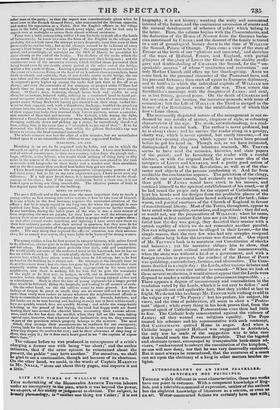LIFE AND TIMES OF WILLIAM THE THIRD. THIS undertaking of
the Honourable ARTHUR TREVOR labours under an incongruity in the plan, which it was beyond the power, Ave suspect, of his ability (*judgment to obviate. The subject, in /glumly phraseology, is "neither one thing nor Cother tt is not biography, it is not history ; wanting the unity and concentred interest of the former, and the continuous succession of eventsand the natural development of schemes of policy which belong to the latter. Thus, the volume begins with the Commentaries, and. the deduction of the House of Nassau from the German barba- rian mentioned by C.ESAR; and the descent &the family is traced in a sort of genealogical history down to the time of WILLIAM the Second, Prince of Orange. Then come a view of the state of Europe at the birth of our " glorious and immortal," and sketches of the wars of Holland, France, and England, with partial glimpses of the glory of Louis the Great and the shabby profli- gacy and double-dealing of CHARLES the Second, for the " un- speakable mercies " of whose " restitution and restoration " our holy Mother Church still offers up her thanksgiving. Anon we conic back to the personal character of the Protestant hero, and his personal fortunes; then start off again to European diplomacy, and to battles in which the individual exploits of WILLIAM are mixed with the general events of' the war. Then comes the Statdholder's marriage with the daughter of JAMES; and next, as is but fitting, general peace. On the death of CHARLES and the accession of his brother, the narrative proceeds with more of connexion ; but the Life of W sm the Third is merged in the history of the ReVolution, with the establishment of which this
first %slaw closes. •
The necessarily disjointed nature of' the arrangement is not re- deemed by any novelty of matter, elegance of style, or colouring characteristic. of the age. The work, notwithstanding, is a read- able and even a useful book. The author is never profound, but he is always clear; and he carries the reader along in a gossipy, chatty way, which is never spirited, but rarely tiresome,—if we except the opening chapters, which appear to have been penned before he got his hand in. Though not, as we have intimated, distinguished for deep and laborious research, Mr. Taavoa seems to have read the memoirs, histories, and state papers of the period; and by furnishing the reader with a careful abstract, or with the original itself, he gives some idea of the intrigues of Louts and CHARLES, and a pretty good notion of the causes which led to the ReSolution, as well as of the cha- racter and .objects of the persons conducting it. And far from creditable the combination appears. The patriotism of the clergy, of which our author vaunts, had evidently no higher inspiration than pelf. If JAMES would have stuck to his masses, and confined himself to the spiritual establishment of his creed,—or if he had taxed the people only for the support of Catholicism, and kept his hands and his designs from the profitable places of the Establishment,—we should have heard nothing of the tardy, luke- warm, and partial exertions of the Church of England in favour of constitutional liberty. Most of the Tories, throughout, appear to have acted with stupidity, cowardice, and ingratitude : they did not, or would not, see the preparations of WILLIAM; when he came, they would at first neither fight him nor join him; but when they found how the day was going, they deserted their master with a raffish rapidity of which we do not remember another parallel. Nor can religious conscience be alleged in their favour,—fur the simple reason, that the very few who had any scruples resigned their offices long before the invasion was dreamt of. One object of Mr. TREVOR 's book is to maintain our Constitution of checks and balances ; yet his narrative obliges him to show, that in one of the most critical conditions of the commonwealth, when the state was without a head or a government, and with a foreign invasion in prospect, the conduct of the House of Peers was quibbling, contradictory, factious, and obstructive. The Com- mons decided in a single day : the Lords, after various debates and conferences, force even our author to remark—" When we look at these several resolutions, it would almost appear that the Lords were disposed to render a settlement of the government impossible. . . . There appears a degree of inconsistency and contradiction in the resolution voted by the Lords, which it is not easy to define :" and it is a significant and applicable fact, that they yielded at last to fright. We do not like to charge Mr. TREVOR with wishing to add to the vulgar cry of " No Popery ;" but his preface, his subject, his views, and the time of publication, all seem to show a " Protes- tant" object ; while every thing in his book proves that, from the general spirit of Catholicism, Protestantism even then had little to fear. The Catholic body remonstrated against the violence of JAMES; all they wanted .'as religious equality. The Pope treated his schemes and his representative with such contempt, that CASTLEMAINE quitted Rome in anger. And when a Catholic league against Holland was suggested to Antichrist, the only use he made of the suggestion was to take care that it should reach the Protestant Republic. That the bigoted and obstinate tyrant, encouraged by irresponsible back-stairs ad- visers, "endeavoured to subvert the constitution of the kingdom;' no one will now deny, nor that he was very deservedly cashiered. But it must always be remembered, that the creatures of a court can act upon the obstinacy of a king in other matters besides re- ligion.


























 Previous page
Previous page